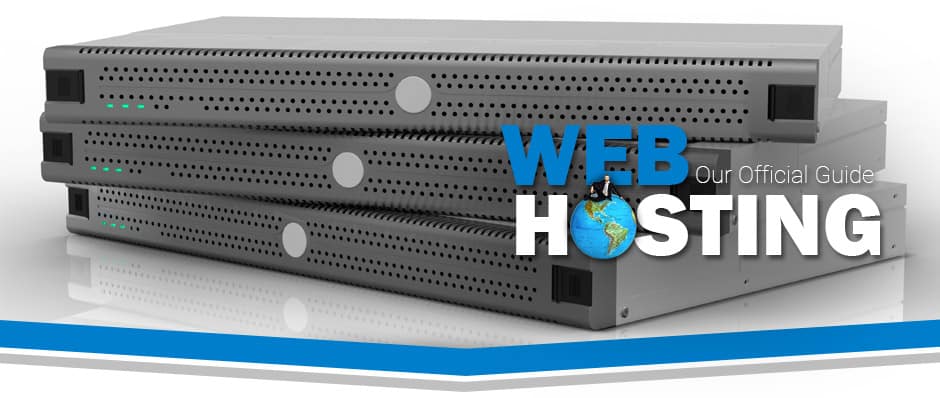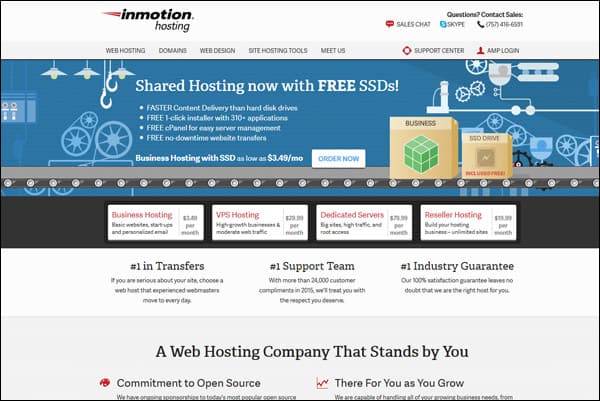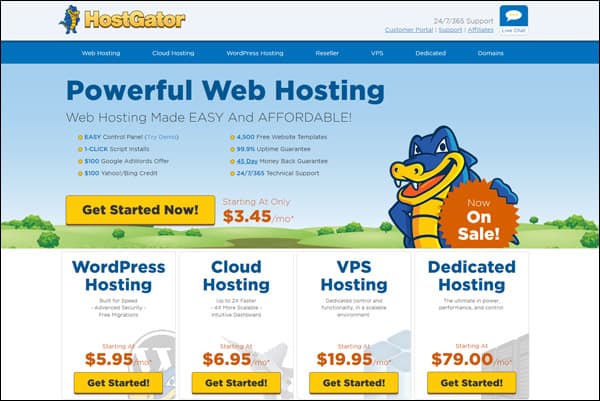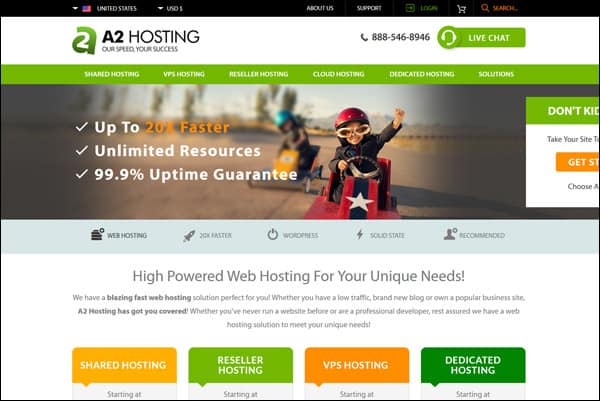Tooltester is supported by readers like yourself. We may earn an affiliate commission when you purchase through our links, which enables us to offer our research for free.
Choosing a dedicated server that is fast, secure, properly managed, and has the right software stack for your development needs is very important when shopping around for a dedicated web hosting plan.
In this article, we’ll cover the best dedicated server hosting companies we’d recommend leasing a server from, some of the benefits you can expect when purchasing a dedicated web hosting plan, and some tips on getting started with your new dedicated server.
The Best Dedicated Web Hosts at a Glance
Here’s a quick overview of our top choices for dedicated web hosting with a short description of what each one is best suitable for:
| Web Host | Starts at: | Recommended for: | Learn more |
|---|---|---|---|
| InMotion Hosting | $95.12/mo | High performance dedicated servers for businesses | View Plans |
| Liquid Web | $149.00/mo | Premium Linux or Windows servers with A+ tech support | View Plans |
| A2 Hosting | $99.59/mo | Customizable unmanaged & managed servers for developers | View Plans |
| HostGator | $119.00/mo | Brand name with solid hardware & performance | View Plans |
| iPage | $119.99/mo | Fully managed dedicated servers for growing sites | View Plans |
Inmotion Hosting
Powerful & affordable dedicated hosting for Businesses
Starts at: $95.12/mo
www.inmotionhosting.com is one of best web hosts on the market and have powerful dedicated servers hosted within their reliable West & East coast data centers.
They offer a wide variety of dedicated plans that are all Linux based (no Windows) and highly configurable.
Their entry level plan (named Essential) starts at $99/mo, but is unfortunately the only plan that does not come with a free SSD (you can still get one at an additional cost).
All plans are fully managed and include cPanel/WHM.
InMotion Hosting is a quality host with a strong commitment to performance, reliability, features, & price. Read our full InMotion review.
Key Features:
- Fully managed Linux
- Starts w/ 8 GB of RAM
- 6 Intel Xeon CPU options
- Highly configurable
- Custom solutions
- Excellent value
- A+ customer support
- 2 hr hardware replacement
- 24/7/365 monitoring
- 30 day money-back
Get started with InMotion today
Starts: $149.00/mo
Liquid Web
Linux or Windows Servers with Heroic Tech Support
www.liquidweb.com offers dedicated server plans with fully managed, self-managed, & core managed options built on the Intel Xeon E3 family hardware (4 to 8 cores).
Each dedicated server starts with 16 GB of RAM, 2 TB of hard disk storage, and 5 TB monthly bandwidth.
A variety of other features, such as offsite backups, a free cPanel/Plesk license, advanced DDoS protection, and CloudFlare CDN support are also included.
Note that their entry level plans currently do not come with SSDs.
Liquid Web is notoriously notable for their “heroic” tech support – a team of certified system admins available in 59 seconds or less – who can assist you with any server related issues/help you may need.
All in all, Liquid Web’s dedicated servers can be recommended for a variety of users – such as high traffic websites, mobile applications, popular CMS websites, blogs, multi-domain marketing campaigns, resellers, independent web publishers, & small businesses with ecommerce stores.
Key Features:
- Windows or Linux O/S
- Fully-managed servers
- Self-managed options
- cPanel/Plesk included
- Premium hardware
- Single & Dual CPU options
- Starts w/ 16 GB of RAM
- “Heroic” tech support
- Offsite backup & CDN
- 100% Uptime SLA
Get started with Liquid Web today
HostGator
Premium Dedicated Server Hosting for Uptime & Reliability
Starts: $119.00/mo
www.hostgator.com is another quality hosting provider that offers premium dedicated server hosting.
They offer a wide variety of configurable Linux and Windows dedicated servers.
Their entry level plan for both Linux & Windows (named Basic), comes with 4 GB of RAM and starts at $119/mo (renews at $174/mo). All plans are fully managed and come with cPanel or Plesk.
Their plans are a bit pricey, but the primary selling point for HostGator is its premium hardware, fully-redundant network, and state-of-the-art datacenter in Houston, Texas.
You get what you pay for and they do have one of the highest uptime and performance stats we’ve monitored. Read our full HostGator review.
Key Features:
- Linux & Windows
- Premium performance
- Fully managed
- Intel Xeon 2 & 4 core
- Award winning support
- Unfortunately no refunds
- Extreme uptime/reliability
Get started with HostGator today
A2 Hosting
Advanced dedicated hosting for better control
Starts at: $99.59/mo
www.a2hosting.com is a great company and a great choice for both businesses and developers who want full control over their dedicated hosting.
A2 Hosting has a variety of managed and unmanaged servers.
Their unmanaged plans start at $119.99/mo (currently on sale for $99.59/mo) and are best for developers who want full control over the server. Their managed plans start at $169.99/mo (currently on sale for $141.09/mo) and are best for businesses.
Both options come with a variety of features and available upgrades such as switching to a SSD.
Their pricing is high, but they focus on premium services with the highest level of performance and reliability. Read our full A2 Hosting review.
Key Features:
- Managed & Unmanaged
- Extreme Performance
- Custom Configurations
- Premium Reliability
- A+ Customer Support
- 24/7/365 Monitoring
Get started with A2 Hosting today
iPage
Best for Beginners & Growing Sites
Starts: $119.99/mo
www.ipage.com is another popular choice and offers fully managed, Linux dedicated server hosting.
iPage utilizes the same data center as Bluehost (both owned by EIG) in Provo, Utah, sharing the same solid performance & reliability of the Bluehost network.
They offer 3 plans named Startup, Professional, and Enterprise.
Although housed and maintained by Bluehost, these plans do differ from the Bluehost ones. For starters, iPage is fully managed and their entry level server comes with a 2 Core 3.5 GHz CPU.
Read our full iPage review.
Key Features:
- Fully managed
- Linux servers
- Bluehost data center
- Dedicated customer support
- Cloud-based flexibility

What to Look for When Purchasing a Dedicated Server Hosting Plan
Dedicated web hosting involves the lease of a single web server in a data center that is provisioned with a specific hardware configuration (CPU, RAM, Storage Drives) and guaranteed not to be accessed by other users in the facility.
Some businesses may actually require more than one web server for their project implementation, depending on the web traffic, but normally web publishers choose dedicated servers because of guaranteed resource allocation and account isolation.
Cloud and advanced VPS configurations have already challenged dedicated server options for cost-efficiency and ability to scale, taking away market share from these services as the industry transitions past the single unit model of hardware resources.
Nevertheless, many developers and business owners prefer dedicated servers because of their greater ability to be configured for programming requirements, web traffic support, and higher level of security.
Below, we’ve outlined the most important options to consider when searching for the best dedicated web hosting solution.
Factors to Consider:
- CPU Benchmark Performances: the difference between the Xeon, Atom, & Opteron product lines
- The Different Types of RAM Memory: primarily DDR3, DDR4, & ECC options currently
- Disk Drive Storage Solutions: HDD (SCSI, IDE/ATA, SATA, & Raid) vs. Solid State Drives (SSDs)
- Bandwidth & Data Center Issues: Internet Backbone Network Speeds, Power Supply, & Cooling
- Operating Systems: Windows vs. Linux & Choosing between the various Linux Distributions
- Control Panels: cPanel (WHM), Plesk, Webmin & Virtualmin vs. Command Line Administration
- Server Extensions: the LAMP/WAMP/LEMP stack + Databases & Programming Languages
- Account Extras: what bonuses, perks, free offers, etc. are bundled with a new account
- Technical Support: the ability of the data center staff or hosting company to support clients
Most dedicated server users are looking for elite hardware configurations at the lowest price, although some shop for bargains on older equipment made available at discount.
Many web and mobile applications with custom code require a complex web server software environment that shared hosting plans cannot support.
While VPS plans are available with configurations equal to or greater than dedicated hardware, they are partitioned on shared server frameworks with multiple users on the same machine.
Cloud hosting plans scale with web traffic beyond what even an elite dedicated server can support under strain.
Business users need to consult with their programming teams and systems administrators to understand the development requirements and web traffic levels expected for production websites, using these factors to guide purchasing decisions.
CPU Benchmark Performance
Independent CPU benchmark tests can be used as a valid way to compare web server hardware and determine the performance differences between CPU series versions.
The most common rack-mount server hardware in use across data centers currently is based on the Intel Xeon and Atom processing chips or the AMD Opteron series.
It is important to distinguish between early model Xeon servers (X series) and the more recently produced models (E series). The major differences are the number of multi-processing cores available (i.e., single, dual, quad, and octa core in the X series) and the amount of RAM that can be installed per unit.
The addition of more multi-processing cores enables a greater number of concurrent threaded processes per CPU.
In 2016, the new Broadwell-based Xeon E5-2600 v4 was released with 20 and 22 core versions, which was then quickly surpassed by Intel Xeon processor E7-8800 v4 product family with 24 cores. AMD has launched a 32-core Naples CPU version to compete with Intel in the high-end web server market.
Innovation in this sector continues at a rapid pace even after the end of Moore’s Law, although significant attention has also turned to GPU servers and new TPU chips that help accelerate machine learning for AI.
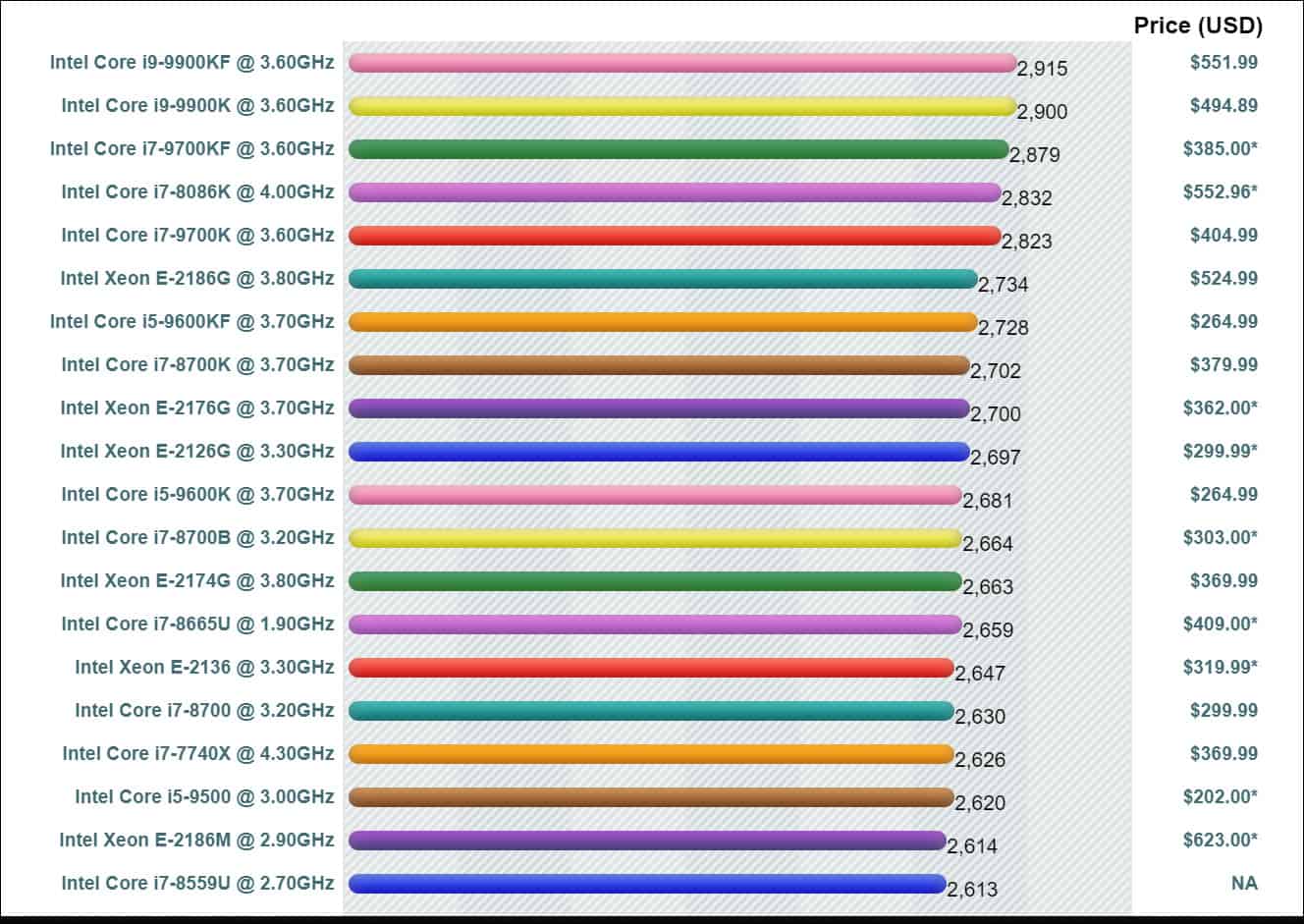 Independent benchmark testing of CPU processing is an invaluable research tool for determining which dedicated server will provide the most value for the money in a web hosting plan.
Independent benchmark testing of CPU processing is an invaluable research tool for determining which dedicated server will provide the most value for the money in a web hosting plan.
The Intel Atom series of processors are intended for low energy usage and not recommended for high performance web applications. The AMD Opteron chipsets (x86 processor) can also compare favorably with the Xeon in web server benchmarks at a lower price per unit.
Most Opteron servers in use in dedicated web hosting are still based on the 6000, 4000, and 3000 series versions. The Opteron processor family also includes a higher performance X series versions and a System on a Chip (SoC) ARM-based line of low energy processors similar to the Atom CPU.
Paying close attention to the SKU of the dedicated server being offered in an account plan and accessing independent benchmark tests is a good way to find the best prices in data center technology.
Otherwise, business owners risk getting locked into a long term contract on old or outdated hardware that will be even slower in comparison to cloud servers and VPS plans by the end of the deal.
RAM Memory Differences
The difference between DDR3 and DDR4 RAM is a determinant between elite web server performance and can also lead to a consequential discount for users willing to lease older technology.
It is important to know every detail of the dedicated server that is being contracted for in order to accurately compare server benchmark performance vs. the available company prices.
In technical specifications:
- DDR3 (400-1066 MHz): 0.80-2.13 GT/s Transfer Rates / 6.40-17.0 GBps Bandwidth
- DDR4 (1066-2133 MHz): 2.13-4.26 GT/s Transfer Rates /12.80-25.60 GBps Bandwidth
DDR4 ECC RAM has an extra chip in the design which is used for “Error Correcting Code” (ECC) which leads to a slightly higher total cost per unit.
Because DDR4 ECC RAM essentially double checks every server process for accuracy in computations, it is viewed as more stable for important financial transactions conducted online in ecommerce but benchmarks at about 2% less speed on average than standard DDR4 RAM when installed in a web server.
Considering that a RAM error could cause server failure and consequential database information loss, some users view ECC RAM as insurance for data integrity in extremely demanding technical applications.
Cheaper prices are available on dedicated hardware using older DDR3 RAM, where many users might not even recognize the difference without benchmark testing or comparison to other platform services.
Disk Storage Solutions
With data storage solutions on dedicated servers, the main standards are SCSI, SAS, NL-SAS, IDE/ATA, and SATA for hard disk drives. SCSI is practically redundant and not commonly found in most current data centers for web hosting, although sometimes these data drives are still used for remote back-ups or off-site storage on older network architecture.
Serial Attached SCSI (SAS) and Near Line SAS (NL-SAS) have replaced the previous generations of SCSI drives in enterprise storage usage, largely because of greater speed and reliability for “big data” backup requirements.
Today, the vast majority of consumer dedicated server storage options in web hosting are based on the SATA drive standard with the main difference being the capabilities of either SSD or HDD.
As the web hosting and data center industry transitions to full reliance on SSD storage, it is often possible to lease older equipment with HDD technology for a cheaper cost, especially on dedicated servers.
However, as SSD storage has over 20x faster speeds in I/O and read/write performance for website hosting requirements, it is not particularly recommended to do so for most business owners, as the performance of the equipment will be much slower vs. other competitive websites.
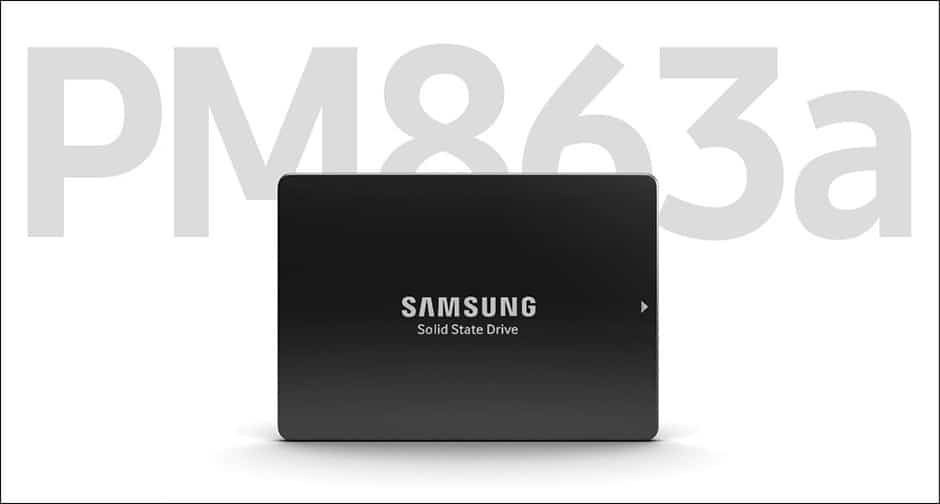
RAID storage options on dedicated servers are used to mirror data on two or more disk drives and to provide a back-up function separate from the root drive containing the OS. Most web hosting companies implement either a RAID 5 or RAID 10 format for data mirrors.
Some cloud hosting systems use data mirroring in RAID storage for load balancing, where network traffic can be routed to more than one active copy of a website depending on which hardware has the most available resources. This reflects growing industry trends to move beyond the “single box” model of web servers.
Nevertheless, because most users are purchasing dedicated servers for account isolation and independence from shared hardware in a data center environment, it is not always guaranteed that a dedicated server plan will include RAID storage backups for data at all.
Therefore, it is important for businesses running dedicated servers to manage their own data backup systems, either by paying extra for RAID mirroring through the webhost or through offsite storage that keeps files in another data center location entirely. There are many third-party companies that specialize in this service for businesses.
In summary, it is recommended to research the technical data on storage capacity before signing up for a long-term plan.
Make sure to choose SSD storage options over legacy HDD hardware for best performance, and implement a RAID system for automated data back-ups if the data center does not provide this service with a dedicated server plan integrally.
Bandwidth & Data Center Issues
Some data centers give users the ability to choose the bandwidth provider on a dedicated hosting account.
For example, HostGator servers offer the choice between ATT, Comcast, Global Crossing, Level(3), and NTT. Other companies offer variable pricing based on the bandwidth rates made available to the account, with dedicated ports ranging from 1 Gbps to 40 Gbps.
For comparison, an “internet backbone” connection to a data center will transmit at speeds up to 40 Tbps. Best practice is to make sure that the hosting company has multiple redundant telecom connections and to evaluate the various hosting plans for bandwidth speed differentials.
Many dedicated server accounts also include limits on data through-put per month which can lead to extra surcharges on high traffic websites with many users or a lot of downloads. Avoid dedicated server plans that intentionally throttle network bandwidth on accounts in order to sell upgrade plans with faster speeds.
Small business users should search for dedicated server hardware with unlimited monthly bandwidth and make regular use of traffic statistics including real-time monitoring of network traffic to have a better understanding of what a popular website or mobile application’s actual requirements are at different times of peak user activity.
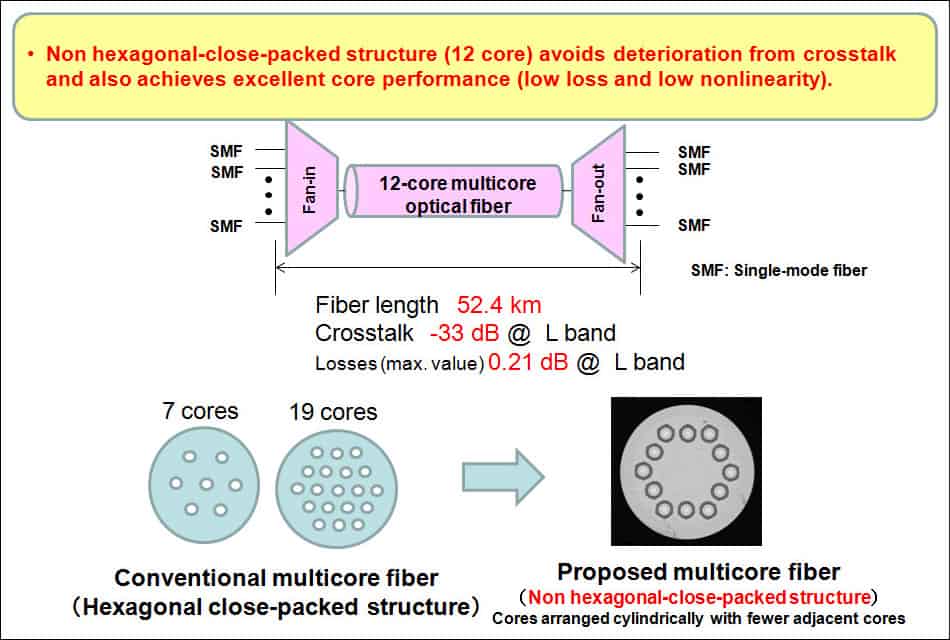
Data center security includes high level physical security measures that prohibits unauthorized users from gaining access to a facility, as well as extensive backup power supplies meant to keep hardware up and running even if the electric grid goes down.
The Uptime Institute’s tier standards (I-IV) can be used to verify and evaluate between web hosting companies, as these ratings must be audited by independent professionals who conduct inspections.
On-site power back-ups at a data center are considered a mandatory requirement for ensuring the continual guaranteed uptime of hosting accounts.
Other data center issues to consider are the commitment to “green” energy that each company pledges, i.e. whether a certain percentage of the electricity consumption used in operations will come from renewable resources like solar, wind, fuel cell, and hydropower.
Dedicated server hardware must be managed on a continual basis by experienced professionals in the cloud, so many business users rely heavily on the reputation of a web hosting company which must be verified both by industry standards and customer reviews.
Colocation centers differ from web hosting data centers mainly in that clients can physically access dedicated hardware and install their own machines in a shared facility for business use.
QUICK TIP
Rack-mount servers have become a wholesale commodity in the web hosting industry due to overproduction, planned obsolescence, and mandatory platform upgrades.
Search for Tier-1 data centers with the latest hardware for best performance at the lowest available prices.
Operating Systems & Control Panels
Many web hosting providers offer dedicated servers for both Windows and Linux platforms, although this is becoming less common for Windows as Microsoft develops its Azure cloud product line.
Linux is the main standard that over 90% of retail web hosting users prefer, whereas Windows is a major requirement for many business software integrations. With unmanaged dedicated server plans, it is usually possible to install either operating system on the hardware, and with both there are numerous different distributions to choose from for configuring the web servers.
Generally, the decision on which operating system to use is made during the architecting stage of web development in advance of any dedicated server purchase, particularly with private & hybrid cloud construction for IT outsourcing or custom-coded web/mobile start-up applications.
Business owners should defer to programmers, web developers, and system administrators when making these choices in practice. The Linux version to use will usually depend on the specific project requirements and licensing fee cost.
Managed dedicated server plans are normally based on CentOS Enterprise Linux with licensed cPanel use for administration, whereas some developers prefer Ubuntu, Debian, RedHat, OpenSUSE, Slackware, FreeBSD, etc. for different reasons.
Note that like CentOS, not every Linux distribution used on web servers is actually free, with more advanced features for cloud orchestration, for example, normally costing an additional licensing fee to the development company under a purchasing agreement with technical support.
CentOS, Cloud Linux, and RHEL all offer cPanel support with WHM, which makes web server configuration and multiple domain hosting much easier to manage for inexperienced users.
Highly trained programmers and systems administrators normally use command line utilities for remote hardware management, while Plesk, Webmin, or Virtualmin can also be used for server configuration on other Linux and Windows platforms with cheaper licensing fees than cPanel.
It is important to understand whether a dedicated server plan includes a free license for installed software or whether these costs will have to be paid in addition to the hardware lease agreement.
In summary, it is the development preference of programming teams for one Linux distribution over another or an enterprise business requirement for licensed Microsoft servers that normally makes the largest difference in the choice of an operating system to use on a dedicated server plan.
Look for a Linux server running CentOS or CloudLinux with a free cPanel and WHM license to save money on over-all costs and guarantee ease of use in administration, as these are considered some of the most stable and well tested for security in the industry.
Private, public, and hybrid cloud orchestration can be accomplished with dedicated server hardware using other software like OpenStack or Apache Mesosphere, which can also be found bundled with distributions of RHEL and OpenSUSE to meet professional enterprise requirements.
Advanced virtualization deployments on dedicated hardware can also be accomplished with platform software like Xen Server, VMware products, OpenVZ/Virtuozzo, Parallels, Microsoft Hyper-V, SolusVM, and Mirantis Cloud software.
Server Extensions & Account Extras
Server extensions refer to programming languages, database frameworks, and third-party utilities that are added to the LAMP/WAMP stack for custom development requirements, feature enhancement, or better system performance at scale.
Server extension requirements are some of the most important reasons that developers building web and mobile applications choose to use dedicated servers, with the other being the need to support higher levels of web traffic in production.
It is important to plan ahead and choose hardware configurations that include the physical resources like RAM, CPU cores, and SSD storage that are needed to support the development requirements under unexpected strain, as well as to plan for variance in rates of web traffic, in order to host a popular business website or mobile application effectively.
NGINX, Varnish Cache, Memcached, HHVM, and other cloud load balancing, page caching extensions, or programming language run-time utilities can all be used to dramatically improve web server performance for high traffic production websites.
All of these solutions will require an experienced systems administrator and web development team to manage effectively, although managed Platform-as-a-Service products can save a lot of time and money.
Account extras like Google AdSense credits, software licenses, administration utilities, developer toolboxes, and data analytics platforms are all commonly included with dedicated server hosting accounts using CentOS and cPanel.
Normally, these add-on features are not a critical element influencing the decision to purchase a particular plan vs. the price of the hardware specifications.
Dedicated server users should focus on finding service plans with elite hardware at the cheapest prices, or cut-rate discounts on older equipment. Business owners and IT purchasing agents should not be overly concerned with special offers and marketing promotions when making the decision on a web hosting plan for dedicated server hardware.
For data center outsourcing and enterprise solutions, the addition of installed cloud software like elastic cluster orchestration, container support, and deep learning/machine learning integration on a web hosting platform has become increasingly important for managing online operations at scale.
The cloud computing paradigm of dedicated server resources looks scarcely similar to the “single box” model that was once a mainstay of web hosting accounts. Many IT companies have already launched “serverless” solutions that provide the same facilities at scale as dedicated servers without the need for complex systems administration at all.
Technical Support
In making a decision between web hosting companies, the quality of customer service and level of technical support provided by the data center staff is considered one of the main differentials that can be used to choose between similarly priced options.
Many companies now offer a certain amount of “1 on 1” time with in-house systems administrators in a data center who will manage the actual installation of software and configuration of contracted web server hardware according to the business requirements exactly.
While this may not always be necessary for experienced users in systems administration, it can be helpful in getting complex projects up and running on new hardware in the cloud more quickly, or with fine tuning web servers for performance.
Also, it is very helpful for developers when the web hosting company provides quick turn-around on support requests rather than canned email replies. Similarly, businesses can waste a lot of time if a company’s support telephone lines always require a long wait on hold to talk to a customer service agent.
It pays to search out specialists in the field who can assist particularly with platform specific issues through expert staff who are friendly, courteous, highly trained in web development issues, and helpful in solving problems.
Many times, large web hosting companies provide worse technical support than smaller, start-up managed hosts who specialize in platform development.
It can pay to research review sites on a company’s brand identity to see what kind of experiences with a webhost’s helpdesk have been reported by other users before committing to a long-term contract on a dedicated server plan.
Conclusion – Final Thoughts on Choosing a Dedicated Server
In summary, the quality of data center operations and the variance in price between web server hardware configurations are considered two of the most important factors to research before choosing a web hosting provider for a long-term dedicated server plan.
It is advised to reference the Uptime Institute’s tier rating system for an independent audit of a web hosting company’s data center facilities.
The installation of multiply redundant internet backbone connections from telecom providers, extensive on-site security measures, and backup power supply facilities are all essential aspects of a data center that should be verified by businesses who trust these companies with their domain presence and customer data.
Most website owners simply choose the web hosting company that provides the latest server hardware at the best overall competitive price in the industry, factoring in aspects of technical support, customer service, the brand’s reputation for security in operations, and in maintaining uptime guarantees.
In making the final decision between dedicated web hosting plans, remember to compare:
- The hardware specifications of the equipment being leased (CPU cores, Mhz, RAM, SSD, etc.)
- The difference between Xeon & Opteron CPUs by date of manufacture & third-party benchmarks
- The inclusion of SSD drives (with or without RAID storage options) vs. HDD performance speeds
- The reputation of the web hosting company in meeting guaranteed uptime commitments
- The choice between managed/unmanaged platforms (OS installation, web security, optimization)
- The inclusion of a free license for software like cPanel, WHMCS, & CloudLinux with the plan
Web publishers, start-ups, popular mobile applications, and IT departments making purchasing decisions around a dedicated server plan for high traffic support will all have different custom requirements that need to be confirmed with the programming and development team.
An experienced systems administrator is essential to managing a dedicated server account effectively, not only for the operating system installation and server extension configuration, but also for the day to day security and maintenance of the environment.
Alternatively, site owners upgrading from VPS or shared hosting to a dedicated server can choose a managed platform where web security, system upgrades, and hardware configuration are all managed remotely by experienced technicians.
Website owners should search for elite server performance at the lowest rates and avoid special promotional offers in favor of data center excellence.
New innovation in cloud hosting may soon make dedicated server plans obsolete, and better/cheaper options are often available on VPS plans with more resource allocation, so it is important to consider how to keep online business operations up to date in a rapidly changing and perpetually innovating web hosting industry.
THE BEHIND THE SCENES OF THIS BLOG
This article has been written and researched following a precise methodology.
Our methodology